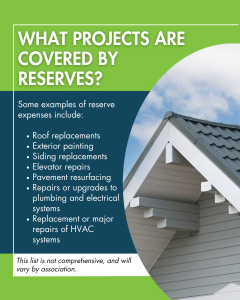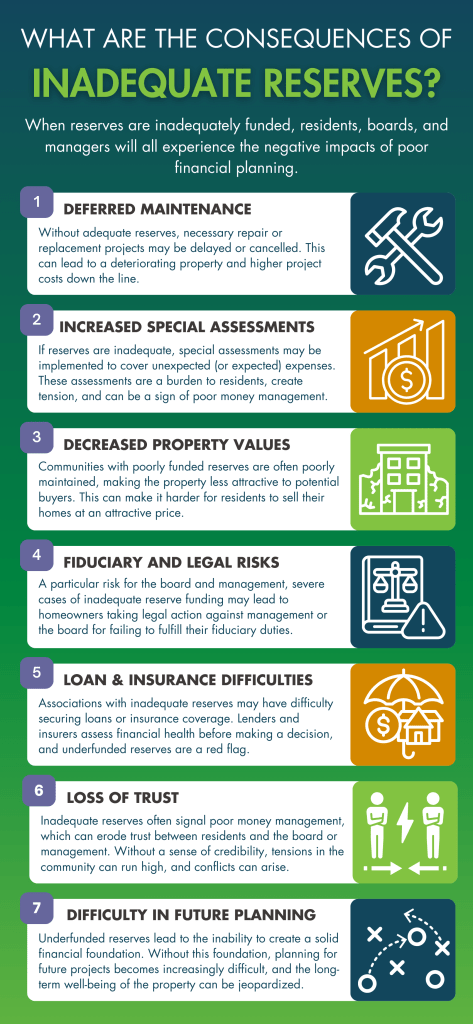Community associations rely on reserve funds to ensure the long-term financial health and sustainability of their communities. Reserves are money set aside to cover major repair and replacement projects of association-maintained components, such as roofs, roads, and amenities like pools or sports courts. Maintaining adequate reserve funds is crucial to keeping any association running smoothly. But, what exactly are adequate reserve funds, and how do they impact the board, managers, and residents?
What are adequate reserve funds?
 The Community Associations Institute’s Reserve Study Standards define adequate reserves as “a replacement reserve fund and stable and equitable multiyear funding plan that together provide for the reliable and timely execution of the association’s major repairs and replacement projects without reliance on additional supplemental funding.” Essentially, maintaining adequate reserves means that significant expenses that aren’t part of the operating budget can be fully covered by reserve funds, preserving and enhancing the community’s infrastructure and property values.
The Community Associations Institute’s Reserve Study Standards define adequate reserves as “a replacement reserve fund and stable and equitable multiyear funding plan that together provide for the reliable and timely execution of the association’s major repairs and replacement projects without reliance on additional supplemental funding.” Essentially, maintaining adequate reserves means that significant expenses that aren’t part of the operating budget can be fully covered by reserve funds, preserving and enhancing the community’s infrastructure and property values.
Because each association is vastly unique, there is no universal dollar amount that establishes adequate reserves. Rather, to determine what constitutes adequate reserves, associations should conduct periodic reserve studies to assess the condition and remaining useful life of each component. Reserve studies provide a funding plan that ensures adequate reserves are available to cover these repair or replacement projects when they come due, avoiding special assessments or loans.
How do adequate reserves impact Board members?
Board members play a crucial role in managing reserve funds and have a fiduciary obligation to act in the best interests of both the property and its residents. This fiduciary duty involves proper upkeep of community assets and avoiding financial mismanagement, both of which are supported by proper reserve funding. By maintaining adequate reserves, boards can make informed decisions about maintenance and repairs and complete these projects in a timely manner, avoiding the need to defer crucial projects or impose special assessments that can be a financial burden on homeowners. When reserve funds are managed properly and the board is transparent with residents about their financial practices, it becomes much easier to maintain a certain level of trust between residents and board members, fostering confidence in the board’s ability to lead with integrity.
Additionally, the financial stability that adequate reserves provide can make it easier for boards to secure loans and insurance coverage. As awareness of the importance of risk management continues to grow, lenders and insurers have begun focusing on reserve studies, and adequately funded reserves in particular, when making decisions about loans and coverage. Well-funded reserves are a sign that boards are soundly managing the association’s finances, which is incredibly important to lenders and insurance companies alike.
How do adequate reserves impact managers?
Community association managers hold the responsibility of advising the board on money management and ensuring that the association’s reserve funding practices are sound, and adequate reserve funding is necessary for managers to effectively do their jobs. Adequate reserves allow managers to address maintenance and repair needs promptly, helping to maintain infrastructure and avoid minor issues from becoming major, costly problems. In order to create and execute accurate financial plans that ensure community stability, properly funded reserves are crucial in avoiding assessments or significant increases in dues. By avoiding the need for sudden financial demands, managers can maintain and increase resident satisfaction within the community.
With the ability to properly maintain the community’s common elements, managers can make sure the community remains attractive to potential buyers as properties with adequate reserves tend to have higher property values. Similar to the board, managers have a fiduciary duty to act in the best interest of the communities they serve, and adequate reserves help them fulfill this duty by making it easier to maintain the property and keep financial practices transparent.
 How do adequate reserves impact residents?
How do adequate reserves impact residents?
Because adequate reserves provide financial stability for the community, residents can gain peace of mind knowing that the board and management are prepared for major expenses without the need for increased dues or special assessments. This is a benefit to any resident but is especially important in communities with residents on fixed incomes who may be unable to afford unforeseen financial pressures. Not only do residents gain peace of mind, but a sense of predictability helps them plan their personal finances effectively and aids in avoiding tension within the community.
People choose to live in community associations for a reason, and one of the main reasons is the amenities that come along with association life. From well-kept landscaping, pools, and clubhouses to the comfort of knowing roof replacements or elevator repairs will be completed in a timely manner, adequate reserves ensure that each amenity and asset will be maintained as expected. Not only does this contribute to the overall living experience but can also help increase property values, which is beneficial to sellers.
Living in a community with governance structures can come with its highs and lows, but adequate reserves dramatically assist in keeping things between residents, the board, and management sailing smoothly. Not only do properly funded reserves offer a sense of trust between all parties, but regular updates and clear communication surrounding reserves can help build confidence in the board’s ability to manage these funds responsibly. After all, residents should feel secure in how their money is being managed.
The Bottom Line
Adequate reserve funding is crucial for the physical and financial wellbeing of community associations, their residents, boards, and managers. From well-maintained common areas to enhanced property values and financial stability, the benefits of properly funding reserves are indisputable. Adequate reserves give boards and managers the ability to make informed financial decisions which directly benefit residents, fulfilling the fiduciary duties of the board and management and avoiding conflict with residents. Because deferred maintenance often leads to more significant, costly issues down the line, well-funded reserves ensure that the property is maintained on schedule without reliance on burdensome special assessments. Copious amounts of work go into keeping a community association operating smoothly – why make it harder by not maintaining adequate reserve funds?


